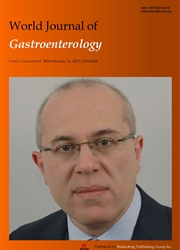

 中文摘要:
中文摘要:
AIM: To investigate the effect of integrin-linked kinase(ILK) on proliferation, metastasis, and invasion of the colorectal cancer cell line SW480. METHODS: In this study, the colorectal cancer cell line SW480 was stably transfected with ILK plasmids, and small interfering RNA(si RNA) was used to knockdown expression of nuclear factor(NF)-κB/p65. Methylthiazole tetrazolium(MTT) assay was performed to measure proliferation, and the wound healing migration assay and matrigel invasion assay were used to test the metastasis and invasion ability of SW480 cells. To explore the epithelial-mesenchymal transition(EMT) process, embryonic development, and the invasion and metastasis of tumors, the protein level of E-cadherin, vimentin, snail, and slug was detected by western blot. Immunofluorescence was also used to detect E-cadherin expression. Western blot was used to determine the level of phosphorylated-inhibitor of kappa B(IκB)a, inhibitor of gamma B(IγB)a, and nuclear factor kappa B(NF-κB) expressions and toexplore the ILK signaling pathway. RESULTS: Western blot results revealed that ILK expression significantly increased when ILK was overexpressed in SW480 cells(P < 0.05). Proliferation, metastasis, and invasion ability were improved in the vector-ILK group compared to the vector group(P < 0.05). Immunofluorescence results revealed that E-cadherin fluorescence intensity decreased after ILK was overexpressed(P < 0.05). Western blot results revealed that the protein expression of E-cadherin was reduced, while vimentin, snail, and slug were upregulated when ILK was overexpressed in SW480 cells(P < 0.05). In order to determine the role of the NF-κB signaling pathway in ILK overexpression promoted EMT occurrence, we overexpressed ILK in SW480 cells and found that levels of NF-κB/p65 and cytoplasmic phosphorylated-IκBa were increased and that cytoplasmic IкBa levels were decreased compared to the control group(P < 0.05). Furthermore, NF-κB/p65 knockout revealed that E-cadherin was increased in the overexpressed IL
 英文摘要:
英文摘要:
AIM: To investigate the effect of integrin-linked kinase (ILK) on proliferation, metastasis, and invasion of the colorectal cancer cell line SW480.METHODS: In this study, the colorectal cancer cell line SW480 was stably transfected with ILK plasmids, and small interfering RNA (siRNA) was used to knockdown expression of nuclear factor (NF)-κB/p65. Methylthiazole tetrazolium (MTT) assay was performed to measure proliferation, and the wound healing migration assay and matrigel invasion assay were used to test the metastasis and invasion ability of SW480 cells. To explore the epithelial-mesenchymal transition (EMT) process, embryonic development, and the invasion and metastasis of tumors, the protein level of E-cadherin, vimentin, snail, and slug was detected by western blot. Immunofluorescence was also used to detect E-cadherin expression. Western blot was used to determine the level of phosphorylated-inhibitor of kappa B (IκB)a, inhibitor of gamma B (IγB)a, and nuclear factor kappa B (NF-κB) expressions and to explore the ILK signaling pathway.RESULTS: Western blot results revealed that ILK expression significantly increased when ILK was overexpressed in SW480 cells (P < 0.05). Proliferation, metastasis, and invasion ability were improved in the vector-ILK group compared to the vector group (P < 0.05). Immunofluorescence results revealed that E-cadherin fluorescence intensity decreased after ILK was overexpressed (P < 0.05). Western blot results revealed that the protein expression of E-cadherin was reduced, while vimentin, snail, and slug were upregulated when ILK was overexpressed in SW480 cells (P < 0.05). In order to determine the role of the NF-κB signaling pathway in ILK overexpression promoted EMT occurrence, we overexpressed ILK in SW480 cells and found that levels of NF-κB/p65 and cytoplasmic phosphorylated-IκBa were increased and that cytoplasmic IкBa levels were decreased compared to the control group (P �
 同期刊论文项目
同期刊论文项目
 同项目期刊论文
同项目期刊论文
 BTB/POZ domain-containing protein 7: Epithelial-mesenchymal transition promoter and prognostic bioma
BTB/POZ domain-containing protein 7: Epithelial-mesenchymal transition promoter and prognostic bioma Comparative proteomic study for profiling differentially expressed proteins between Chinese left- an
Comparative proteomic study for profiling differentially expressed proteins between Chinese left- an WD40 repeat-containing 62 overexpression as a novel indicator of poor prognosis for human gastric ca
WD40 repeat-containing 62 overexpression as a novel indicator of poor prognosis for human gastric ca High Expression of SOX2 and OCT4 Indicates Radiation Resistance and an Independent Negative Prognosi
High Expression of SOX2 and OCT4 Indicates Radiation Resistance and an Independent Negative Prognosi Association between mismatch repair gene andirinotecan-based chemotherapy in metastatic colon cancer
Association between mismatch repair gene andirinotecan-based chemotherapy in metastatic colon cancer HK2 is a radiation resistant and independent negative prognostic factor for patients with locally ad
HK2 is a radiation resistant and independent negative prognostic factor for patients with locally ad Bone morphogenetic protein-4 induced rat hepatic progenitor cell (WB-F344 cell) differentiation towa
Bone morphogenetic protein-4 induced rat hepatic progenitor cell (WB-F344 cell) differentiation towa 期刊信息
期刊信息
